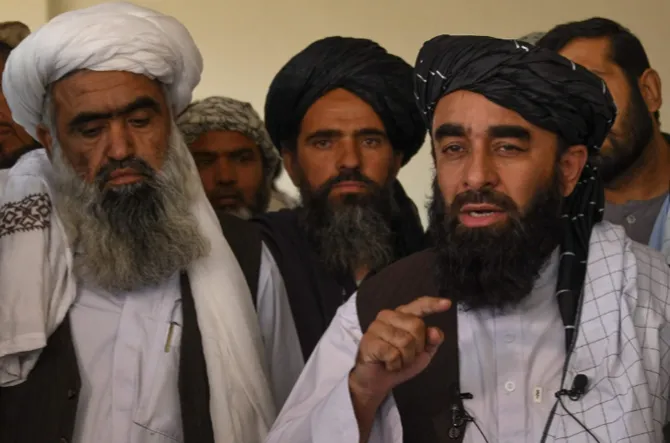
Since the Taliban’s return to power in Afghanistan, their governance has indicated an intricate and complicated landscape to manoeuvre. They project their rule as the Islamic Emirate, rooted in their interpretation of Sharia law, and assert a commitment to basic human rights within their interpretation of Islamic law in international engagements. However, this depiction sharply differs from on-ground realities. The multifaceted concerns surrounding the Taliban's governance necessitate an assessment. Despite their claims of legitimacy, their actions have fuelled significant scepticism, particularly regarding human rights and inclusivity. Over the past two years, the Taliban has faced internal power tussles and demolished key inherited institutions, greatly impacting Afghan society, particularly women. Their justice system prioritises morality-based resolutions over a more conventional judiciary and have attempted to centralise the revenue collection system. This analysis aims to shed light on the complexities of their internal governance and external interactions.
Concerns surrounding the Taliban’s governance in Afghanistan
The Taliban primarily operates within the existing state structures and institutions it inherited. But while it retained the scaffolding of the previous Republic, certain entities like the Ministry of Women’s Affairs and the Afghanistan Independent Human Rights Commission were dismantled, and the offices dedicated to parliamentary affairs were also disbanded. The existing administration has taken on a caretaker role, without a specified timeline for the establishment of a permanent government. This delay may stem from the internal tensions that arose during the cabinet's formation, as various Taliban factions vied for positions.
The Taliban administration expresses apprehension about proceeding with the enrolment of girls in schools and universities.
While the Taliban's de facto authorities have offered assurances that restrictions, particularly on education access, would be temporary, on-the-ground realities have revealed an accelerated, systematic system of segregation, marginalisation, and persecution. The Taliban administration expresses apprehension about proceeding with the enrolment of girls in schools and universities. They are concerned that such a move could potentially alienate their predominantly rural support base. Similarly, there is a fear that extremist groups like the Islamic State-Khorasan Province (ISKP) could exploit this rural support base. Given such fears, they have re-established the Ministry of Vice and Virtue, tasked with supervising moral concerns such as regulating women's roles, imposing bans on music, and enforcing dress codes.
The Taliban's justice system: Morality-based resolutions
The Taliban's justice delivery approach is deeply rooted in Islamic law. There is limited evidence of a functional judiciary or a penal code. Instead, the emphasis is on morality-based resolutions overseen by the Ministry of Vice and Virtue. This strategy has resulted in significant curtailments of personal freedoms and individual rights. The Taliban's participation in local dispute resolution has elicited varied responses from Afghans. Some view it as a means to achieve swift and efficient resolutions, while others harbour concerns about potential abuse of power and human rights violations within this unique Islamic justice system.
The Taliban's participation in local dispute resolution has elicited varied responses from Afghans.
In suppressing peaceful opposition to their governance, the Taliban has resorted to violence, targeting human rights defenders, women activists, journalists, and intellectuals. The General Directorate of Intelligence (GDI) under the Ministry of Interior, and the Ministry of Promotion of Virtue and Prevention of Vice have emerged as the central tools of repression. The Taliban employed methods such as extrajudicial killings, arbitrary detentions, enforced disappearances, torture, and coerced confessions to suppress opposition and maintain control over Afghanistan.
Centralising taxation: Taliban’s economic governance
While the group’s justice delivery and general governance measures have invited criticism from the international community, the Taliban has effectively leveraged their success in taxation and in stabilising the currency as a testament of their ability to manage the country. The third quarter of this year saw the Afghani emerge as the best performing currency. As per Bloomberg, the inflow of humanitarian aid and some currency control measures taken by the Emirate helped propel it to the top. The most recent Afghanistan Economic Monitor, published by the World Bank, also shows an improvement in certain economic indicators. Notably, the first five months of this year have witnessed an 8-percent increase in revenue collection compared to the same period last year. These positive indicators are used by the group to further legitimise their rule and debunk concerns about the faltering state of the Afghan economy. But despite these positive macroeconomic indicators, their benefits have not reached down to the Afghan people. Concerns about how the revenue is being distributed and what areas are given more priority have persisted and will remain unaddressed in the near future.
The Taliban’s diplomatic outreach has prioritised highlighting the economic component of their foreign policy, with a focus on regional trade and transit.
In a bid to centralise cross-border trade and dismantle the patronage systems that flourished under the Republic, the Taliban has focused on centralising the revenue collection system through the Ministry of Finance. Doing away with roadside checkpoints, which were manned by them when they were insurgents, and working to channelise all trade through the official border crossing points, the group aims to assure that the revenue collected directly reaches the central coffers. This ‘rerouting and canalisation of trade’ feeds into the overall attempts by the Taliban officials to centralise control.
Since 2021, the Taliban’s diplomatic outreach has prioritised highlighting the economic component of their foreign policy, with a focus on regional trade and transit. They double down on the importance of infrastructure development in ‘Afghanising’ the country. At an event held recently, the International Energy Agency (IEA) signed mining contracts worth US$ 6.5 billion with Chinese, British, and Turkish firms. Back in July, at the meeting between the United States (US) Special Representative and Taliban representatives in Doha, the US expressed support for initiating a technical dialogue with the group to help stabilise the economy. There has also been a significant increase in economic engagement. Last month, a US delegation co-hosted a business conference with the Taliban to develop a plan to rebuild the economy. The Taliban’s Deputy Prime Minister of Economic Affairs talked about their ‘investor-friendly laws’, inviting more investment.
The Taliban's ability to address internal power struggles and establish a representative administration will significantly impact their international standing and domestic stability.
The recently concluded Moscow Format Consultations in Kazan, Russia, saw participation from India, Iran, China, Kazakhstan, Kyrgyzstan, Pakistan, Turkmenistan, and Russia. The Islamic Emirate was represented by the Acting Foreign Minister, Amir Khan Muttaqi. The Kazan Declaration, which was released after the consultation, was similar in intonation and content as the previous declarations on the situation in Afghanistan—the countries called on the group to contain the rise of the ISKP, sustain the ban on poppy cultivation, and work with the regional countries to effectively address both these issues. They also lamented the lack of progress in ensuring that a more inclusive set-up takes shape in the country. This edition of the conference was important as it was the first after Beijing appointed a new ambassador to the country. Since 2021, several countries including Pakistan, Iran, China, and Russia, have maintained open embassies to facilitate active communication with the Taliban regime without extending formal recognition. Despite concerns about the group’s inability or unwillingness to act on certain issues or heed the calls for giving women their rights, the meeting also focused on expanding economic ties, both bilaterally and regionally.
In assessing the complexities and challenges regarding the Taliban’s governance in Afghanistan, certain aspects warrant thorough examination. Firstly, the formation of a more inclusive government remains a pivotal challenge. The Taliban's ability to address internal power struggles and establish a representative administration will significantly impact their international standing and domestic stability. Secondly, concerns about their approach towards delivering justice will persist as the group continues with their current reliance on morality-based resolutions. Economically, questions about the equitable distribution of resources and benefits from increased revenue collection still remain unanswered. How the Taliban chooses to address these concerns will influence the socio-economic well-being of the Afghan population. In terms of diplomacy, the international community will continue to seek their de facto engagement on terrorism-related issues and other regional matters.
Ghulam Mohiuddin Mangal is an independent researcher whose work primarily focuses on Afghanistan and its neighbouring states, including China, Pakistan, Russia, and Iran.
Shivam Shekhawat is a Junior Fellow with the Strategic Studies Programme at Observer Research Foundation
The views expressed above belong to the author(s). ORF research and analyses now available on Telegram! Click here to access our curated content — blogs, longforms and interviews.




 PREV
PREV



